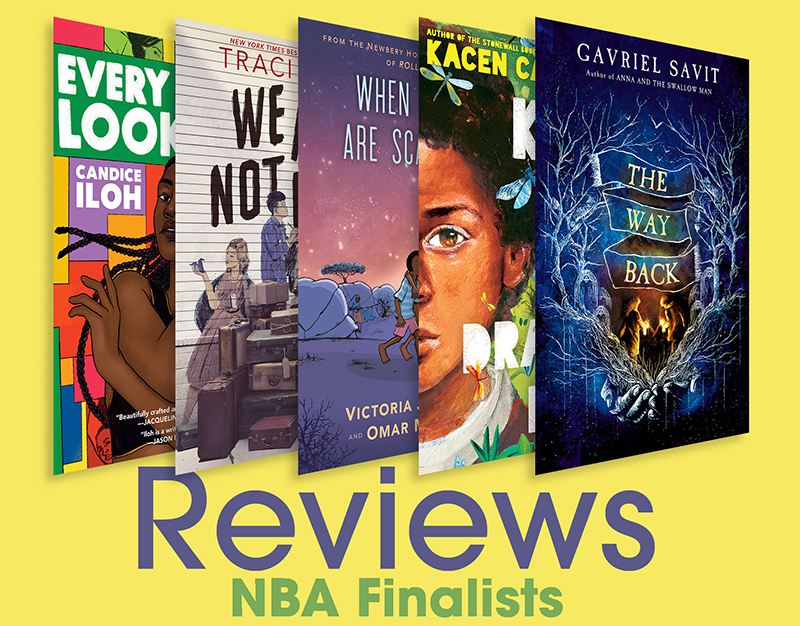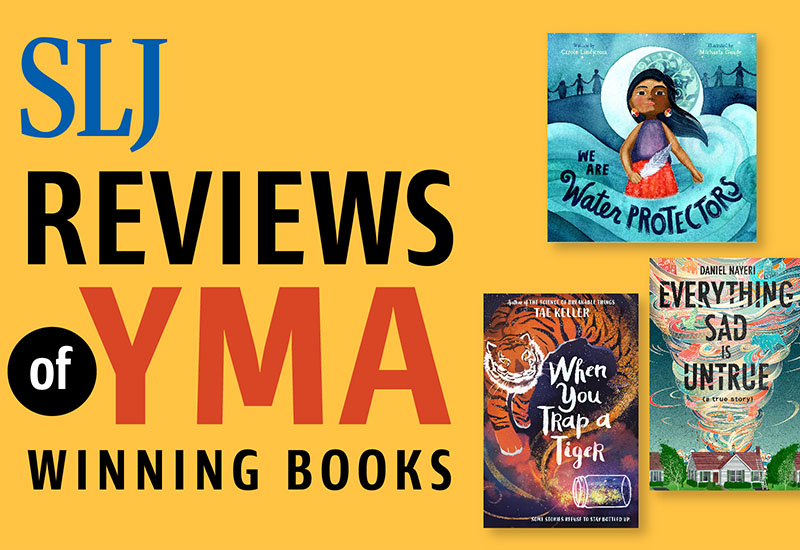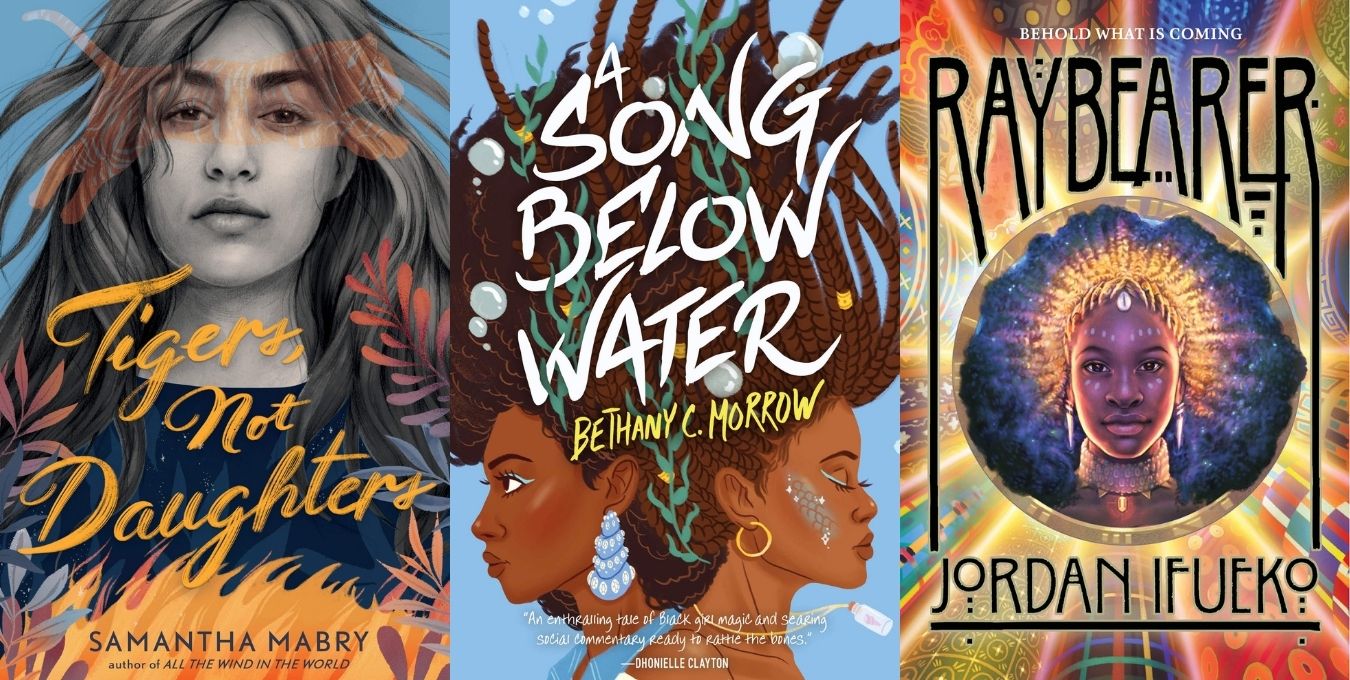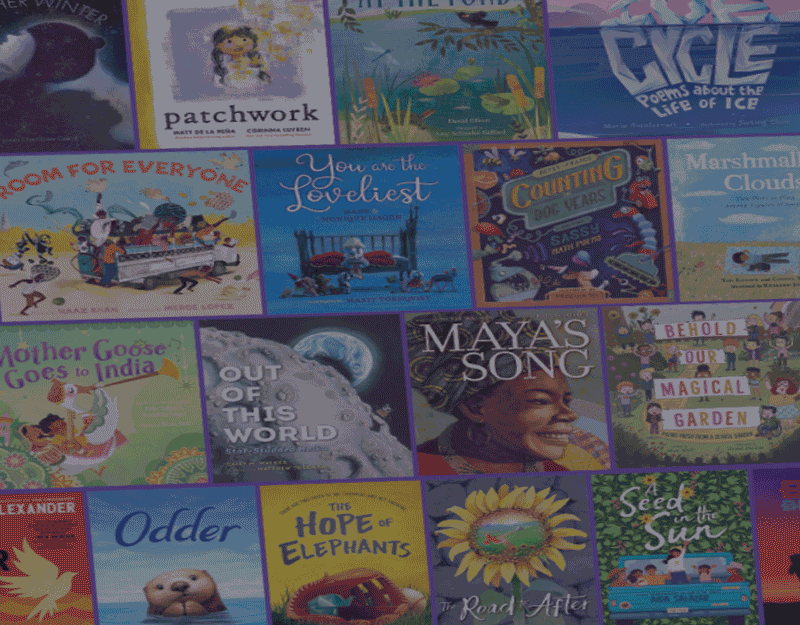Honor Books
I’m back! I’ve spent the week on the road, presenting “The Best Young Adult Books of the Decade” for the Bureau of Education & Research with stops in Cincinnati, Columbus, Akron, and Chicago. I managed to keep up in the comments, but wasn’t very successful at posting (obviously). I’m not in San Diego (in case you’re looking for me), and will be watching the awards announcements online with most of you. I can’t wait!
Anyway, I wanted to continue the conversation about honor books that we started. It doesn’t surprise me that votes didn’t shift dramatically on our second poll. We didn’t have any discussion so it was hard for anyone to sense a collective shift toward or away from certain books (which likely would have happened in face-to-face discussion).
ADVERTISEMENT
ADVERTISEMENT
I’m glad Eric brought up the lone honor book myth, and that Nina quickly dispelled it. Of course, it’s certainly true that that is one way to get to a lone honor book (that is, when two equally strong books emerge as Medal candidates and multiple ballots fail to distinguish a clear winner). But our situation was different. We had a clear winner from the very first vote, and another title that also distinguished itself.
Lone honor books are not very popular with fans, but the committees who opt for this route often tend to acquit themselves favorably from a historical standpoint. I would argue that in the past twenty years the only committees I would give an A+ to are the 1991 Newbery (MANIAC MAGEE and THE TRUE CONFESSIONS OF CHARLOTTE DOYLE) and the 1999 Newbery (HOLES and A LONG WAY FROM CHICAGO), and a large part of that is that they didn’t burden themselves with an extra honor book or two of obviously lesser quality. Those four books easily remain in the top 25% of Newbery books in the two past decades.
Another false myth is that a committee with lots of honor books couldn’t make up its mind. (Again, it’s probably certainly true for some committees–perhaps those with numerous ballots?–but not true of all committees). Everybody ought to have a least one title on the list that they can be proud of, and honor books can often be olive branch gestures. Then, too, committees may reach for underrepresented books. There are many factors that contribute to the honor book decision and they are complex and dynamic, ever-changing and hard to pin down and articulate.
Some people also believe that too many honor books dilutes the power and prestige of the award and I think this is kind of true. Regardless of what the Newbery committee recognizes in any given year, the five most distinguished books are rarely all middle grade novels. So if a committee just wants to recognize four to six novels, then I would agree that dilutes the power of the award, but if the committee’s picks mirror the diversity of the field they have considered, then I’m all for more honor books. Which means that from our poll, I wouldn’t want to name ONE CRAZY SUMMER the winner with KEEPER, FORGE, CONSPIRACY, COUNTDOWN, THE KNEEBONE BOY, and THE DREAMER as the six honor books. I think this would make Team-Get-Kids-Reading-the Best-of-the-Best very happy, but as a card-carrying member of Team Best-Book-and-Devil-Take-the-Audience, the only way I could sanction six honor books is something like this. Medal: ONE CRAZY SUMMER. Honors: KEEPER, CONSPIRACY, DARK EMPEROR, SUGAR CHANGED THE WORLD, THEY CALLED THEMSELVES THE KKK, and CITY DOG, COUNTRY FROG.
So history may indeed be kinder to us if we name ONE CRAZY SUMMER (119) the Medal winner with KEEPER (64) as the lone honor book. I personally would prefer to go down two more–FORGE (47) and CONSPIRACY (44)–because I think those two books are just as good–if not better–than the first books, and I might even swallow the poison pill–COUNTDOWN (39)–to make it happen. But maybe not. Maybe I would be too pissed off about the dismissive treatment of the poetry, nonfiction, and picture books.
Filed under: Uncategorized
About Jonathan Hunt
Jonathan Hunt is the Coordinator of Library Media Services at the San Diego County Office of Education. He served on the 2006 Newbery committee, and has also judged the Caldecott Medal, the Printz Award, the Boston Globe-Horn Book Awards, and the Los Angeles Times Book Prize. You can reach him at hunt_yellow@yahoo.com
ADVERTISEMENT
ADVERTISEMENT
SLJ Blog Network
The 2024 Ninja Report: Bleak
A Sequel Coming This Summer That You Won’t Want to Miss: Bob Shea Discusses His Latest
Review| Agents of S.U.I.T. 2
Navigating the High School and Academic Library Policy Landscape Around Dual Enrollment Students
Read Rec Rachel: New YA May 2024
ADVERTISEMENT








Thanks for delving into this Jonathan. Our second ballot is also a good illustration of picking honors from a winning ballot, rather than balloting again. I’ve always preferred this kind of result (though I only know from my own experience and our Mock discussions, since the number of ballots for the actual award is always secret). The honor books are “also truly distinguished” and should represent titles that members felt were deserving of gold…just that got pushed a *little* aside by something even better.
(Which is why it always drives me nuts when you say something would “make a nice honor book.” 🙂 There should be no such distinction in your mind!! You should be voting, always, for 1st 2nd and 3rd choices for the *medal*. )
We just finished our student Mock yesterday, and had quite the honors dilemma. Because I didn’t create a shortlist or limit the number of students who wished to participate, we couldn’t follow the conventional scoring. The only mandate I put on the students who wanted to participate was that they read at least 4 books, from a very long list. 3 of which needed to be starred, by me, as viable candidates for Newbery glory. I think the final list had over 50 possibilities. Some of the students read the bare minimum. But a few read into the double digits, with one girl reading 33 titles. I had them rank their top three just as we did here. But I told the students before we began the vote that they did not need to choose 3 books if they felt like they did not read 3 they thought deserved to be honored.
Looking at this mess I knew we could not get a legitimate vote. I will admit that was not the purpose of doing this anyway. I was more interested in exciting kids about the act of reading, and building a community of book lovers, also to bring a mid-winter sport to the library. As I heard Jonathan say once, “It’s easy to get boys to read if you make it a competition.”
We tallied following the weighted point system we used here and gave the students the results before they left. We had a clear winner, THE CLOCKWORK THREE, and one close honor book, ONE CRAZY SUMMER, It has been our tradition to honor two books. The other book that received the next closest vote total was OUT OF MY MIND.
The husband of a friend of mine is a high-functioning medical statistician. I asked if he could work out some fancy math to consider how well each book did based on how many readers it had. He worked up a spiffy Excel spreadsheet that allowed me to insert data and come up with a more representative result. It was really awesome. I didn’t input any books that had fewer than 4 readers. The results didn’t change for the top two but there were three books grouped within 3 points of each other, with TURTLE IN PARADISE and SCUMBLE, minutely ahead of OUT OF MY MIND. I won’t be changing the results for the students.
I do feel I accomplished what I wished, in building excitement and glamour to reading. Next year I will consider making a short list, so we can be more legit, but it may end up excluding many students – so maybe not.
By the way Jonathan I’m impressed with the conviction you have that your 6 pets are the only deserving honor books. If only all committees could have one member? My committee of one would disagree with yours over a few of those. Good luck on Monday.
Personally, I love having lots of Honor Books — and don’t really think it dilutes the power of the award.
What I’ve never quite understood is the cachet of being a single Honor Book. I see it all the time, in articles, on dustjackets, etc: “His book ______ was the lone Honor Book for the 19__ Newbery Award” or “Her books include ________, the sole Newbery Honor Book in 19__.”
Is there some special prestige associated with a book being a solo Honor?
Yes, in theory all honor books should be worthy of the Medal, and yet it’s not hard to see marked differences in quality some years. For me, CLAUDETTE was Medal worthy, CALPURNIA and MOUNTAIN/MOON were not, but were “nice honor books,” while HOMER P. FIGG was a great Notable book. Now I know some of you will disagree with me and say CALPURNIA and MOUNTAIN/MOON are Medal worthy–fine–but does anyone want to take up a defense of HOMER? Anyone?
Multiple honor books are good for fans, gatekeepers, publishers, and authors. The general reading public does not place honor books within the context of their years so the power of the Newbery does not get diluted by a large group of honor books. The only prestige of a solo honor book is that you know, for sure, that it is second place. CLAUDETTE could’ve been second place, but it also could’ve been fifth.
DaNae, I really like that you allow your students to read widely from the field the way the real Newbery committee does, and I would encourage you to continue that, but I do think you need to narrow choices down earlier for the sake of being on the same page. Perhaps you start with a long list in September, the kids nominate for a shortlist in November, and then everybody needs to read the top 5-10 books by January. Something like that?
I’m not convinced that those are the only deserving honor books. I said if you want five or six honor books then I want to see diversity, not just a handful of middle grade novels. I want this–THE NIGHT FAIRY, KAKAPO RESCUE, A TALE DARK AND GRIMM, THE ODYSSEY, TURTLE IN PARADISE, and MOCKINGJAY–or this–LING & TING, PATHFINDER, BALLET FOR MARTHA, THE NOTORIOUS BENEDICT ARNOLD, OUT OF MY MIND, and CLEMENTINE, FRIEND OF THE WEEK.
Jonathan, that’s brialliant! I was trying to find some common ground. I could even make up a summer reading list for the eagar beavers. I was conseiring asking for a small doantion from when they joined so I could purchase extra copies of books. We would then raffle them off at the end. The only problem will be including books with a later release date. Maybe I could send out bribes for a few ARCs.
Oh yes, I adored HOMER. I’m way to distant from my reading of the book to wield a legitimate defense, but he did remain on my GoodReads Mock predictions for a very long time. He finally lost out to the much overlooked WILD THINGS. I was smug when he won an honor. I know you will be able to give me 50 reason why he was undeserving, but I’m content to remain smug for now.
Yes, yes, you are smug that HOMER got an honor, but . . . Nina just said that honor books must also be worthy of the Medal . . . so what I am looking for is not a general defense of the good qualities of HOMER, but rather a rationale that places HOMER as the most distinguished contribution to American literature for children, better than WHEN YOU REACH ME, better than CLAUDETTE COLVIN . . . See, I don’t even think the members of the committee think HOMER is in the same league. So why did they recognize it? Could be several reasons, but those reasons are complicated, and probably only partially related to the literary quality of the book.
See, there you go being all logical and rational, and all about the criteria, when all I want is to glory when my favorites get some recognition. This is why you have been on the committee and I never will be. I’m OK with that, as long as I get to feel smug every once in awhile.
Oh, hey, speaking of being on the committee… any thoughts on how to get on it some day? I suppose I should start by volunteering to be on other committees?
You need to be a member of the American Library Association and the Association for Library Service to Children (the division that administers the award). Then fill out the committee volunteer form, do committee work and network at ALA, and sooner or later . . .
I still don’t understand why Conspiracy is considered medal worthy when it does not stand alone. I tried reading it without reading the previous books in the series and was completely lost, and it was hard to appreciate what I did read because there wasn’t any context provided. So I’m curious, why would you include it as a possible honor book?
Elizabeth, many of us here not only believe that A CONSPIRACY OF KINGS does stand alone, but that the Newbery criteria do not stipulate that it must do so. Rather, the criteria state that *this* book on its own must contain distinguished elements. We’ve had numerous conversations about this book and these issues, and I would encourage you to go back through the archives and read the discussion both for and against the book.
I read it without having read the other books, or even knowing what they were about, and still thought it was one of the best books of the year. To each her own, but I don’t think it’s possible to say definitively that it’s impossible to understand/appreciate without the other books.
Elizabeth, I read it Conspiracy without having read the other three, and had minimal confusion. It may help that I’m a regular fantasy reader and am therefore accustomed to dropping myself into fantasy worlds with which I’m initially not familiar (and my only frustration with the worldbuilding in Conspiracy was with linguistic details. I found that pretty impressive; she’s writing primarily for an audience who’s already had the world built, and still managed to make it real and layered for someone new to it, without extensive visits from the Exposition Fairy or As You Know, Bob conversations.)
And, as Jonathan said, a book doesn’t need to stand alone, it just needs to be distinguished on its merits. Though I’m willing to bet that a certain amount of standing alone helps it get the necessary rereads from the committee . . . whether or not it should.
Jonathan, how on earth can you suggest that “See, I don’t even think the members of the committee think HOMER is the same league. So why did they recognize it? Could be several reasons, but those reasons are complicated, and probably only partially related to the literary quality of the book.” ?? Really. Were you a fly on the wall in the discussion? Aren’t you taking your own feelings and projecting them on the committee?
I think there’s a lot of notable craft in Philbrick’s book. I’m not sure that *I* would call it distinguished (there’s always books I feel that way about on the podium), but I see no reason to doubt the process of that committee.
Okay, okay, that came out awkward. I didn’t mean to “doubt the process of that committee,” but rather note that finding a book that you can agree on is just as important as finding a book that is distinguished. And, obviously, WHEN YOU REACH ME *did* beat HOMER P. FIGG so nobody need explain that. HOMER also obviously had substantial support on the committee (and probably not like CITY DOG, COUNTRY FROG either, where everybody wanted to only put their third place vote on it), otherwise it wouldn’t have been honored. What I was ineffectively trying to say, however, is that I imagine there were some people on the committee who may be just as nonplussed as we are, Nina. I certainly always feel that way about at least one book, too–even when I’m on the committee. Even when I *am* a fly on the wall, I don’t always understand why, am not always graced with enlightenment, why out of the many fine books, people are voting for *that* one, especially when they could be voting for *this* one and *this* one.
I’ve also tried to make clear that, my indifference notwithstanding, there *are* scenarios where I myself would have, not voted for HOMER, but wholeheartedly and unreservedly assented to its Newbery Honor. If CLAUDETTE and HOMER were clustered together, for example, and taking one as an honor book meant taking the other. Or, say, CLAUDETTE was a lone honor book (like KEEPER) with CALPURNIA, MOUNTAIN/MOON, and HOMER clustered slightly below (like CONSPIRACY, FORGE, and COUNTDOWN) then I could have supported it, taking all three books to promote harmony and goodwill on the committee (because I wasn’t personally invested in any of those, but I’d follow the Golden Rule . . . if it was CONSPIRACY would I want someone to be generous? Oh, yeah). I think most of us probably could envision a scenario where we could accept a book we don’t like to get one that we do. That’s part and parcel of the consensus process, the process that allows you get one or two books you love, one or two you’re indifferent about–and leave one or two out in the cold, breaking your heart in the process. Book committees are not for the faint of heart.
A couple more points . . .
I’ve said it before, but it bears repeating again. Do not confuse consensus with unanimity or agreement. The committee is not a single entity but rather fifteen individuals with fifteen different value judgments that converge and diverge in unpredictable ways. They are never of one mind about anything, and the consensus process allows for a decision to be reached without coming to agreement on fundamental issues. For example, if CONSPIRACY gets picked as the winner, I’d bet money that some committee members will be thinking, “But it doesn’t stand alone!” and “But it’s too old!” and “But I couldn’t get any of my kids to read it!” and “But it’s not nearly as distinguished as Book X!” Whatever wins, however, there will be some committee members thinking similar thoughts. This division will be mirrored in the hall, and it will be mirrored in the children’s book community at large. (And really, since there’s just no pleasing everybody, the committee might as well follow their charge and vote their conscience.)
I also want to point out that when a committee comes to consensus rather quickly (like first or second ballot) then it might introduce startling results, both omissions and contenders. As I mentioned previously, on that first ballot it’s wide open, you’ve discussed about forty books that could get a vote from somebody, and you’re just not entirely sure how to read the room, which books to support, which you hope somebody else will support because you couldn’t quite find room for it in your top three. Let’s say ONE CRAZY SUMMER wins on the first ballot, and you decide to use the winning ballot for honors . . . What if everybody just assumed that everybody else was going to vote for KEEPER because you had such a wonderful discussion about it . . . Or what if TURTLE IN PARADISE has a surprising amount of support from another great discussion and everybody decided to vote for it because they thought surely everybody else would vote for KEEPER. Perhaps the more ballots you go through, the easier it is to turn the tide, but if you get quick consensus it can make things interesting. Doesn’t have to, but it can.
It’s almost a shame there aren’t more honor books if there are books that year that merit it. It’s such a great distinction that I wish it were freely given for books that qualify rather than a set small number.